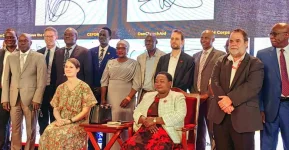Uganda just started a big new program to help refugees and the local people who live near them. Prime Minister Robinah Nabbanja kicked off the Uganda Refugee Resilience Initiative, which Denmark pays for with 145 billion shillings. That equals about 40 million US dollars. The program runs for over four years, from September 2024 through December 2028.
The program teaches people better farming methods that work even as the climate changes. It also helps them take care of their land and natural resources. Women receive special attention since they often face bigger problems during environmental crises. The Danish Refugee Council leads the work in West Nile, covering the Madi-Okollo, Terego, Koboko, Yumbe, Obongi, and Moyo districts.
Save the Children runs the program in other parts of Uganda, including the Adjumani, Lamwo, and Kyegegwa districts. Through the program, people learn many useful skills. They discover better farming methods, early warning systems, and ways to preserve food after harvest. They also learn about money management, business skills, planting trees, saving energy, and finding new ways to make a living.
Uganda welcomes more refugees than any other African country. Around 1.8 million refugees currently live there, and more arrive daily. The government lets refugees live among regular citizens. They can work jobs and use public services just like Ugandans do. This approach differs from many countries that keep refugees isolated in camps.
Climate change makes life harder for everybody in these areas. The land feels pressure from more people using it, which damages the environment. Natural resources run low, and ecosystems suffer. Many refugees and locals farm for their food and income, but these problems make farming difficult. Women and children make up most of the refugee population.
These groups already face discrimination and rights violations. Climate change hits them especially hard, making their problems even worse. Signe Winding Albjerg, the Danish Ambassador to Uganda, explained that the new program aims to address urgent needs. She mentioned that Denmark and Uganda have worked together for over thirty years.
People keep coming to Uganda from nearby countries with conflicts. They flee from South Sudan, the Democratic Republic of Congo, Somalia, Burundi, and other troubled places. This puts stress on local communities as they share resources with newcomers. At the same time, Uganda experiences unpredictable weather, droughts, and floods due to climate change.
Competition increases for water, fuel, and good farmland. Women suffer the most since they usually take care of their families. Prime Minister Nabbanja talked about how Uganda handles refugees differently than most countries. Instead of keeping refugees in camps, the government gives them land and access to services. They can contribute to the economy alongside Ugandans.
Nabbanja stressed that money for this program must reach the people who need it most. She criticized other projects in which up to 60 percent of funds went toward workshops, allowances, and meetings instead of helping people directly. She said the government wants concrete results that improve lives not just talk. Uganda plans to keep supporting refugees as it balances their needs with those of its citizens.
The program teaches people better farming methods that work even as the climate changes. It also helps them take care of their land and natural resources. Women receive special attention since they often face bigger problems during environmental crises. The Danish Refugee Council leads the work in West Nile, covering the Madi-Okollo, Terego, Koboko, Yumbe, Obongi, and Moyo districts.
Save the Children runs the program in other parts of Uganda, including the Adjumani, Lamwo, and Kyegegwa districts. Through the program, people learn many useful skills. They discover better farming methods, early warning systems, and ways to preserve food after harvest. They also learn about money management, business skills, planting trees, saving energy, and finding new ways to make a living.
Uganda welcomes more refugees than any other African country. Around 1.8 million refugees currently live there, and more arrive daily. The government lets refugees live among regular citizens. They can work jobs and use public services just like Ugandans do. This approach differs from many countries that keep refugees isolated in camps.
Climate change makes life harder for everybody in these areas. The land feels pressure from more people using it, which damages the environment. Natural resources run low, and ecosystems suffer. Many refugees and locals farm for their food and income, but these problems make farming difficult. Women and children make up most of the refugee population.
These groups already face discrimination and rights violations. Climate change hits them especially hard, making their problems even worse. Signe Winding Albjerg, the Danish Ambassador to Uganda, explained that the new program aims to address urgent needs. She mentioned that Denmark and Uganda have worked together for over thirty years.
People keep coming to Uganda from nearby countries with conflicts. They flee from South Sudan, the Democratic Republic of Congo, Somalia, Burundi, and other troubled places. This puts stress on local communities as they share resources with newcomers. At the same time, Uganda experiences unpredictable weather, droughts, and floods due to climate change.
Competition increases for water, fuel, and good farmland. Women suffer the most since they usually take care of their families. Prime Minister Nabbanja talked about how Uganda handles refugees differently than most countries. Instead of keeping refugees in camps, the government gives them land and access to services. They can contribute to the economy alongside Ugandans.
Nabbanja stressed that money for this program must reach the people who need it most. She criticized other projects in which up to 60 percent of funds went toward workshops, allowances, and meetings instead of helping people directly. She said the government wants concrete results that improve lives not just talk. Uganda plans to keep supporting refugees as it balances their needs with those of its citizens.












